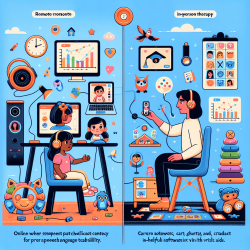Introduction
In the realm of speech-language pathology, particularly when working with children, understanding the broader social dynamics that influence behavior and development is crucial. The recent study titled "The influence of gender-equitable attitudes on sexual behaviour among unmarried adolescents in rural Tanzania: a longitudinal study" provides insights that can be adapted to improve outcomes in speech-language pathology. By fostering gender-equitable attitudes, we can create environments that support positive development and communication skills in children.
Understanding Gender-Equitable Attitudes
The study highlights how gender-equitable attitudes at both community and individual levels can significantly impact behaviors. For instance, in communities with high gender-equitable attitudes, there was an increase in health-seeking behaviors such as HIV testing and a decrease in age-disparate partnerships. These findings suggest that equitable environments encourage healthier and more proactive behavior.
Application in Speech-Language Pathology
Speech-language pathologists (SLPs) can draw parallels from these findings to enhance their practice. Here are some strategies to consider:
- Create Inclusive Environments: Encourage environments where all children feel valued and heard, regardless of gender. This can foster confidence and participation in communication activities.
- Promote Positive Role Models: Use materials and examples that depict diverse and equitable gender roles. This can help children develop a balanced understanding of gender norms.
- Engage Families and Communities: Work with families to promote gender-equitable attitudes at home. This can reinforce positive behaviors and communication skills learned during therapy.
- Continuous Professional Development: Encourage SLPs to engage in training that addresses gender norms and their impact on communication development.
Encouraging Further Research
While the study provides valuable insights, it also highlights the need for further research in diverse contexts. Practitioners are encouraged to explore how gender-equitable attitudes can be fostered within their specific practice settings. This could involve collaborating with researchers to conduct studies that examine the impact of these attitudes on child communication outcomes.
Conclusion
Integrating gender-equitable attitudes into speech-language pathology practice can enhance outcomes for children. By creating supportive and inclusive environments, SLPs can help children develop strong communication skills and positive social behaviors. To read the original research paper, please follow this link: The influence of gender-equitable attitudes on sexual behaviour among unmarried adolescents in rural Tanzania: a longitudinal study.










